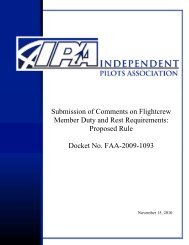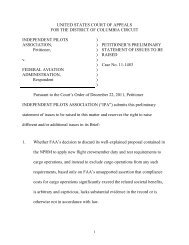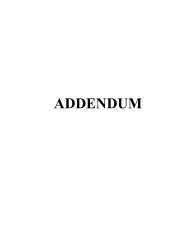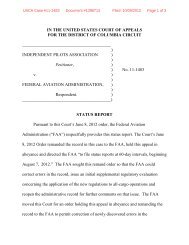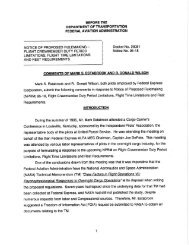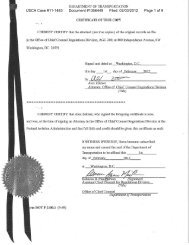Exhibits Vol 2 - Independent Pilots Association
Exhibits Vol 2 - Independent Pilots Association
Exhibits Vol 2 - Independent Pilots Association
You also want an ePaper? Increase the reach of your titles
YUMPU automatically turns print PDFs into web optimized ePapers that Google loves.
Downloaded from oem.bmj.com on December 21, 2012 - Published by group.bmj.com<br />
Sleep deprivation produces impairments equivalent to those of alcohol intoxication 653<br />
Table 6<br />
Equating the eVects of sleep deprivation and alcohol consumption<br />
Hours (decimal) of wakefulness equivalent to BAC concentrations<br />
BAC 0.05% BAC 0.1%<br />
Test and measure<br />
Mean 95% CI %* Mean 95% CI %*<br />
Reaction time task:<br />
Speed (ms) 18.04 17.12 to 18.96 76 18.71 17.56 to 19.86 64<br />
Accuracy (misses) 17.31 16.51 to 18.11 42 17.74 16.51 to 18.97 45<br />
Dual task:<br />
Speed (ms) 17.73 16.75 to 18.71 84 19.65 18.58 to 20.77 67<br />
Hand-eye coordination (level of diYculty) 18.43 17.41 to 19.45 79 19.42 18.40 to 20.44 58<br />
Tracking task:<br />
Hand-eye coordination (level of diYculty) 18.25 17.37 to 19.13 74 19.01 18.91 to 19.97 61<br />
Mackworth clock vigilance:<br />
Speed (ms) 17.08 16.20 to 17.96 82 18.10 16.85 to 19.35 58<br />
Accuracy (misses) 17.64 16.72 to 18.56 68 18.80 17.93 to 19.67 76<br />
Symbol digit task:<br />
Speed (ms) 18.55 17.43 to 19.67 50 18.91 17.92 to 19.90 48<br />
Speed (symbols inspected (n)) 18.52 17.46 to 19.58 57 18.64 17.65 to 19.63 79<br />
Accuracy (correct (%)) 16.91 15.72 to 18.10 41 18.39 17.01 to 19.77 42<br />
Spatial memory task:<br />
Accuracy (length of recalled sequence) 18.05 17.09 to 19.01 86 17.88 16.92 to 18.84 64<br />
*Numerator=number of subjects contributing data; denominator=number of subjects whose range of BAC incorporated 0.05%<br />
(n=37 or 38) or 0.1% (n=33).<br />
Amount of sleep deprivation required to produce performance decrements equivalent to varying concentrations of blood alcohol<br />
(BAC), and the time of day at which the equivalence occurred in this study.<br />
about 13–23 h sleep deprivation), reaction<br />
speed decreased by 57% for the Mackworth<br />
test, 9% for reaction time, 27% for dual task<br />
and 15% for symbol digit tests. Hand-eye<br />
coordination decreased by between 31% for<br />
the tracking component of the dual task and<br />
26% for the tracking task alone. Accuracy also<br />
decreased markedly with sleep deprivation.<br />
The number of missed signals increased by<br />
more than 40% for the Mackworth test, by<br />
187% for the reaction time test, and the<br />
number of false alarms increased by 200% for<br />
the Mackworth test. The symbol digit test only<br />
showed decrements for the speed measures but<br />
not the accuracy measure. The grammatical<br />
reasoning and memory and search tasks<br />
showed only relatively small decreases of<br />
around 5%–10% with increasing sleep loss for<br />
any measures.<br />
The levels of sleep deprivation estimated to<br />
produce decrements in performance equivalent<br />
to varying concentrations of alcohol are shown<br />
for each performance measure in table 6. The<br />
results indicate that on average, 0.05% equivalence<br />
occurred after being awake for around<br />
16.91 to 18.55 hours, placing the time of the<br />
eVect in this study to between 2238 and 0017.<br />
At a BAC of 0.1%, equivalence occurred after<br />
between 17.74 and 19.65 hours of wakefulness<br />
which falls in the late evening to early hours of<br />
the morning, corresponding in this study to<br />
between 2328 and 0123. Measures within and<br />
between tests were aVected at very similar levels<br />
of sleep deprivation. The performance test<br />
that seemed to be aVected first was the passive<br />
vigilance test, the Mackworth clock test, where<br />
equivalence to a BAC of 0.05% occurred after<br />
just over 17 hours of wakefulness for all measures.<br />
The accuracy measure of the symbol digit<br />
test reached levels equivalent to 0.05% alcohol<br />
earlier than any other measure for any test, but<br />
equivalence occurred considerably later for the<br />
other symbol digit test measures. The likelihood<br />
of missing targets in the reaction time test<br />
was also aVected by sleep deprivation slightly<br />
earlier than other tests equivalent to a BAC of<br />
0.05% as it also occurred at just over 17 hours<br />
of wakefulness. The two tests that showed little<br />
change with increasing sleep loss, grammatical<br />
reasoning and memory and search tasks, were<br />
not included in this analysis as alcohol equivalences<br />
are likely to be misleading.<br />
Table 6 shows that the percentage of subjects<br />
showing poorer performance than a BAC of<br />
0.05% and 0.1% across the session 8–13<br />
window varied considerably between tests.<br />
More than three quarters of subjects showed<br />
deterioration in performance to become poorer<br />
than the BAC of 0.05% for speed measures in<br />
the simple reaction time, dual task, and Mackworth<br />
clock vigilance tests, and in the accuracy<br />
of the spatial memory search test. By contrast,<br />
for the accuracy measures of the simple<br />
reaction time and symbol digit tasks only<br />
around 40% of subjects showed performance<br />
decrements suYcient to be at or poorer than<br />
the BAC of 0.05%. As might be expected, for<br />
most tests, a smaller percentage of subjects<br />
showed performance levels equivalent to a<br />
BAC of 0.1%. Nevertheless for most tests,<br />
more than half of the subjects showed deterioration<br />
in performance equivalent to a BAC of<br />
0.1%. Fewer subjects reached a BAC of 0.1%<br />
for the accuracy measures of reaction time and<br />
symbol digit tests, as was found for 0.05%<br />
equivalence. For a few measures, more subjects<br />
reached equivalence to a BAC of 0.1% than<br />
0.05%, notably, accuracy on the Mackworth<br />
test, and the number of symbols inspected in<br />
the symbol digit test. This finding is most likely<br />
because these measures had a performance<br />
ceiling and many subjects remained at the ceiling,<br />
even at a BAC of 0.05%, and only showed<br />
a performance decrement between the BACs of<br />
0.05% and 0.1%.<br />
Discussion<br />
This study shows that commonly experienced<br />
levels of sleep deprivation depressed performance<br />
to a level equivalent to that produced by<br />
alcohol intoxication of at least a BAC of 0.05%.<br />
At the end of periods of waking of 17–19 hours,<br />
performance levels were low enough to be<br />
www.occenvmed.com



